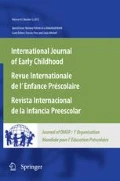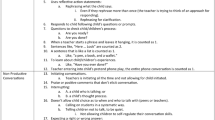Abstract
To maintain team learning for assistants in preschools, dialogue and group discussions are important. These dialogues and discussions can happen both as a part of spontaneous supervision and as a part of an organized process of supervision. Bakhtinian theory of understanding and its notion of dialogue could be used to organize supervision of preschool assistants in Norway. In this study, the goal is to investigate how assistants in preschools in Norway experience supervision and explore how supervision practice could be organized through Bakhtinian ideas and the concepts of chronotopes and chronotopic thresholds. Pedagogical experiences that shift the thresholds of communication can provide a means of operating on the boundaries of meanings within pedagogical situations. These processes encompass reflection and transformation in understanding experiences. Surveys were completed by preschool assistants in 28 preschools and a series of interviews also conducted with administrative leaders, preschool teachers, and preschool assistants. The data indicated that assistants believe that opportunities for reflection and sharing of experiences with others at work would help them learn and become better professionals. It is important that preschool assistants are acknowledged and allowed to discuss their experiences and values. This, in turn, requires supervisors who are able to supervise from a holistic perspective.
Résumé
Le dialogue et les discussions de groupe sont importants pour conserver un apprentissage en équipe chez les assistants en école maternelle. Ces dialogues et discussions peuvent se produire aussi bien dans le cadre d’une supervision spontanée que dans celui d’un processus d’encadrement organisé. La théorie de compréhension de Bakhtin et sa notion de dialogue pourraient être utilisées pour organiser la supervision des assistants de maternelle en Norvège. L’objectif de cette étude est d’examiner comment les assistants des écoles maternelles norvégiennes perçoivent la supervision et d’explorer comment la pratique de la supervision pourrait être améliorée à travers les idées baktiniennes et les concepts de chronotope de seuils chronotopiques. Les expériences pédagogiques, qui changent les seuils de communication, peuvent fournir un moyen de travailler sur les limites des significations dans les situations pédagogiques. Ces processus englobent la réflexion et la transformation dans la compréhension des expériences. Au cours d’une enquête menée dans 28 écoles maternelles, les assistants ont répondu à des questionnaires, et une série d’interviews a été réalisée auprès des directeurs d’école, des instituteurs et des assistants de maternelle. Les données indiquent que les assistants croient que les occasions de réflexion et de partage avec leurs collègues de travail pourraient les aider à devenir de meilleurs professionnels. Il est important que les assistants en école maternelle soient reconnus et qu’ils puissent discuter de leurs expériences et leurs valeurs. Pour cela, il faut avoir des conseillers capables de les encadrer depuis une perspective holistique.
Resumen
El mantener al equipo en un aprendizaje para los asistentes a los preescolares, las discusiones de grupo y el diálogo son importantes. Estos diálogos y discusiones pueden ocurrir, tanto como parte de un proceso organizado de supervisión, como de un proceso de supervisión espontánea. La teoría Bathkiniana sobre el entendimiento y su noción del diálogo, podría ser utilizada para organizar la supervisión de los asistentes al pre-escolar en Noruega. En este estudio, el objetivo era investigar cómo los asistentes a pre-escolares en Noruega experimentaron la supervisión, y explorar cómo la supervisión práctica podría ser organizada a través de ideas Bathkinianas y los conceptos de cronotopos y cronotópicos. Las experiencias pedagógicas que cambian los umbrales de la comunicación pueden proporcionar un medio de funcionamiento en los límites de significados de situaciones pedagógicas. Estos procesos abarcan la reflexión y transformación en la comprensión de experiencias. Las encuestas fueron completadas por asistentes de preescolares en 28 centros preescolares y una serie de entrevistas realizadas, también, con líderes administrativos, maestros de preescolares y asistentes de preescolares. Los datos indicaron que los asistentes creen que las oportunidades para la reflexión y el intercambio de experiencias con otros en el trabajo los ayudaría a aprender y a ser mejores profesionales. Es importante que los asistentes de preescolares reconozcan y permitan discutir sus experiencias y valores. Esto, a su vez, requiere que los supervisores sean capaces de supervisar desde una perspectiva holística.
Similar content being viewed by others
References
Aasen, W. (2010). Førskolelæreren som teamleder og samarbeidspartner-ledelsesdilemmaer i barnehagen [Preschool teacher as a team leader and cooperative partner—Dilemmas for leadership]. Norsk pedagogisk tidsskrift, 4, 294–305.
Aasen, W. (2012). Teamarbeid i barnehagen[Team work in preschool]. Bergen: Fagbokforlaget.
Akkerman, S. F., & Bakker, A. (2011). Boundary crossing and boundary objects. Review of Educational Research,. doi:10.3102/0034654311404435.
Bakhtin, M. M. (1975). Boпpocы литepaтypы и эcтeтики[Problems of literature and aestetics]. M.: Xyдoж. Лит.
Bakhtin, M. M. (1981). The dialogic imagination. Austin: University of Texas Press.
Bakhtin, M. M. (1984). Problems of Dostoevsky’s poetics. Minneapolis: University of Minnesota Press.
Bakhtin, M. M. (1986). Speech genres and other late essays. Austin: University of Texas Press.
Bakhtin, M. M. (1990). Art and answerability: Early philosophical essays. Austin: University of Texas Press.
Bakhtin, M. M. (1993). Toward a philosophy of the act. Austin: University of Texas Press.
Bakhtin, M. M. (2004). Dialogic origin and dialogic pedagogy of grammar: Stylistics in teaching Russian language in secondary school. Journal of Russian and East European Psychology, 42(6), 12–49.
Bibler, V. S. (2009). The foundations of the school of the dialogue of cultures program. Journal of Russian and East European Psychology,. doi:10.2753/RPO1061-0405470102.
Bøe, M. (2009). Ledelsesutfordringer i barnehagen [Challenges for leadership in preschool]. Norsk pedagogisk tidsskrift, 3, 165–177.
Cesar, M., & Ligorio, L. (Eds.). (2013). The interplays between dialogical learning and dialogical self. Charlotte, NC: Information Age Publishing.
Dalin, Å. (1999). Veier til den lærende organisasjon [Towards a learning organization]. Oslo: Cappelen Akademisk forlag.
EuCoRe. (2011). Competence requirements in early childhood education and care. A study for the European Commission. Directorate-General for Education and Culture.
Fecho, B. (2011). Writing in the dialogical classroom: students and teachers responding to the texts of their lives. Urbana, IL: National Council of Teachers of English.
Gardiner, M. (2004). The dialogics of critique: M.M. Bakhtin and the theory of ideology. London: Routledge.
Handal, G., & Lauvås, P. (1987). Promoting reflective teaching. Milton Keynes: Open University Press.
Jensen, V. S. (2009). Into the marginal zone: an autoethnographic journey through teaching experience. Master Thesis in Philosophy of Education. University of Bergen, Bergen.
Kunnskapsdepartementet [Norwegian Ministry of Knowledge]. (2011). Stortingsmelding 41- Kvalitet i barnehagen [White Paper 41 – Quality in preschool].
Lazzari, A. (2012). Reconceptualising professional development in early childhood education. A study on teachers’ professionalism carried out in Bologna province. Bologna: University of Bologna.
Leander, K. M., & Sheehy, M. (2004). Spatializing literacy research and practice. New York: Peter Lang.
Løkken, M. I., & Gradovski, M. (2014). Barnehagen som lærende organisasjon: bruk av nære læringsformer som veiledning og simulatortrening i forhold til kompetanseutvikling for assistentene [Preschool as a learning organization: use of supervision and simulator training to increase the level of competence among the preschool assistants]. In A. B. Reinertsen, B. Groven, A. Knutas, & A. Holm (Eds.), FoU i praksis 2013 conference proceedings (pp. 187–193). Trondheim: Akademika forlag.
Løvgren, M. (2012). I barnehagen er alle like? Om arbeidsdeling blant ansatte i norske barnehager [Are all equal in preschools? On the problem of task distribution in Norwegian preschools.]. In B. Aamotsbakken (Ed.), Ledelse og profesjonsutøvelse i barnehagen og skole [Leadership and professional performance in preschool and school] (pp. 37–50). Oslo: Universitetsforlaget.
Markova, I. (2003). Dialogicality and social representations: The dynamics of mind. Cambridge: Cambridge University Press.
Matusov, E. (2009). Journey into dialogic pedagogy. New York: Nova Publishers.
Matusov, E. (2011). Authorial teaching and learning. In E. J. White & M. Peters (Eds.), Bakhtinian pedagogy (pp. 21–46). New York: Peter Lang.
Matusov, E., & Brobst, R. (2013). Radical experiment in dialogic pedagogy in higher education and its centauric failure: chronotopic analysis. New York: Nova Publishers.
Miyazaki, K. (2011). Encountering another dialogic pedagogy. Journal of Russian and East European Psychology, 49(2), 36–43.
Pratt, D. D. (1988). Andragogy as a relational construct. Adult Education Quarterly,. doi:10.1177/0001848188038003004.
QuestBack. (2014). Enterprise Feedback Suite (EFS). London, UK. Retrieved from http://www.questback.com/uk
Renshaw, P. (2007). A commentary on the chronotopes of different `cultures of learning’: Transforming classrooms from trading-places into relational-places of learning. International Journal of Educational Research, 46(3–4), 240–245.
Schön, D. (1983). The reflective practitioner. London: Basic Books.
Senge, P. M. (1990). The fifth discipline: the art and practice of the learning organization. New York: Doubleday.
Senge, P. M., Kleiner, A., Ross, R., Roth, G., & Smith, B. (1999). The dance of change. New York: Doubleday.
Sidorkin, A. M. (1999). Beyond discourse: Education, the self, and dialogue. Albany, NY: State University of New York Press.
Sidorkin, A. M. (2002). Learning relations: impure education, deschooled schools, and dialogue with evil. New York: Peter Lang.
Solomadin, I., & Kurganov, S. Y. (2009). The history of world culture as dialogue of cultures middle and high school curricula. Journal of Russian and East European Psychology, 47(2), 3–29.
Star, S. L. (1989). The structure of ill-structured solutions: Boundary objects and heterogeneous distributed problem solving. In L. Gasser & M. Huhns (Eds.), Distributed artificial intelligence (pp. 37–54). San Mateo, CA: Morgan Kaufmann.
Steinnes, G. S. (2007). Vilkår for profesjonell identitet? [Conditions for professional identity?]. Oslo: G. S. Steinnes.
Tidman, P. (1996). Critical reflection: An alleged epistemic duty. Analysis, 56(4), 268–276.
Wegerif, R. (2007). Dialogic, educational and technology: expanding the space of learning. New York: Springer.
White, E. J. (2013). Circles, borders and chronotope: education at the boundary? Knowledge Cultures, 1(2), 264–279.
White, E. J., & Peters, M. (Eds.). (2011). Bakhtinian pedagogy. New York: Peter Lang.
Author information
Authors and Affiliations
Corresponding author
Rights and permissions
About this article
Cite this article
Gradovski, M., Løkken, I.M. Chronotopic Thresholds, Reflection, and Transformation of Supervision Experiences for Preschool Assistants in Norwegian Preschools. IJEC 47, 331–345 (2015). https://doi.org/10.1007/s13158-015-0137-x
Published:
Issue Date:
DOI: https://doi.org/10.1007/s13158-015-0137-x




